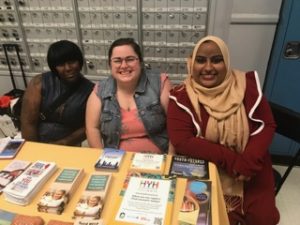
I am thrilled to assume my new position as education attorney with the Law Project at CCH. I run outreach, professional training, and legal clinics on the educational rights of students who experience homelessness. These are offered at school and community venues throughout the Chicago area, focusing on suburban Cook County and the collar counties. I also run monthly legal clinics at the Waukegan Public Library, Family Resource Center in Bolingbrook, Wayside Shelter in Elgin, and family shelters in the Chicago area
I help our staff of six attorneys provide legal aid to homeless children, youth, and families on school-related matters. Issues include immediate enrollment, school discipline, special education services, preschool access, transportation, and school fee waivers. I also assist clients in disputes over the rights and services to which homeless students are entitled under state and federal law.
In September, I concluded a two-year fellowship at CCH – the second Equal Justice Works fellow assigned to CCH in five years. My project was to advocate and provide legal assistance focused on the educational rights of homeless students, including new outreach sites in the suburbs. I closed 143 educational rights cases in two years. The cases included transportation, enrollment, preschool access, and school fee waiver issues.
While attending Notre Dame law school, I spent a summer at CCH interning through the Public Interest Law Initiative (PILI). I also interned another summer at the Chicago Lawyer’s Committee for Civil Rights Under Law, Inc. For both internships I conducted case intakes and outreach to homeless youth. I also drafted a memo that led to Illinois state agencies releasing guidelines that clarified unaccompanied youth are eligible for SNAP food benefits.
I am excited to continue advocating for the educational rights of families and children experiencing homeless. Education plays a significant role in ending homelessness. Quality and appropriate education provides consistency, resources, and a social network for students. For students experiencing homelessness, school might be the only space that feels familiar to them and the only place they know they will receive support, including regular meals.
The CCH model of combining advocacy, community education, and direct representation is incredibly impactful in addressing systemic barriers for people experiencing homelessness. I am honored to be given the opportunity to work for an organization that works tirelessly for the rights of students, youth, families, and adults who are coping with homelessness.
